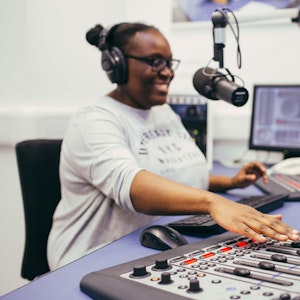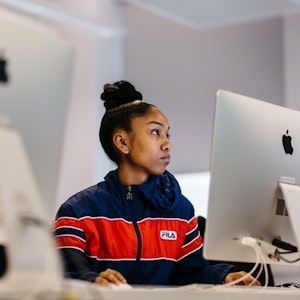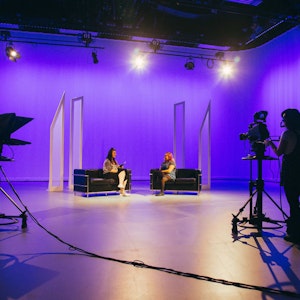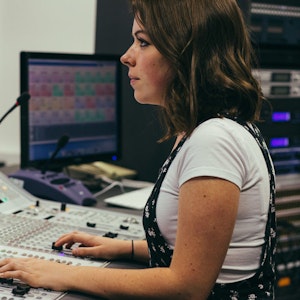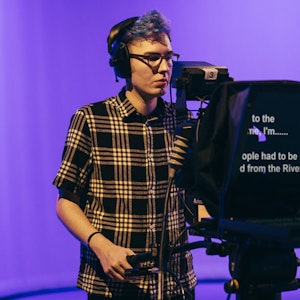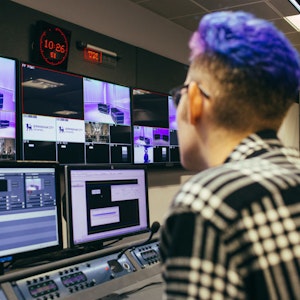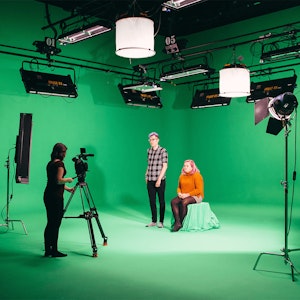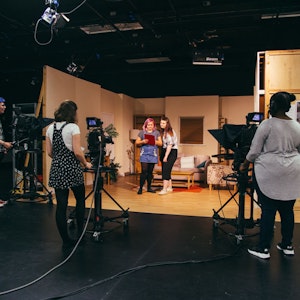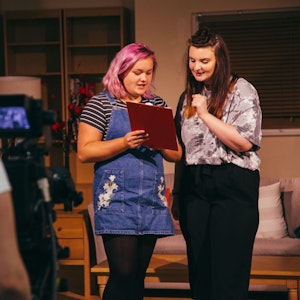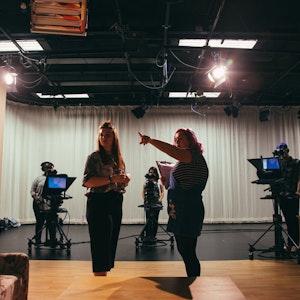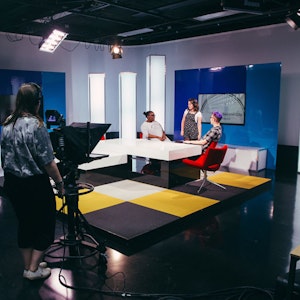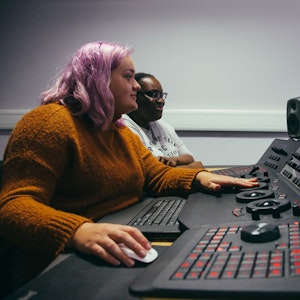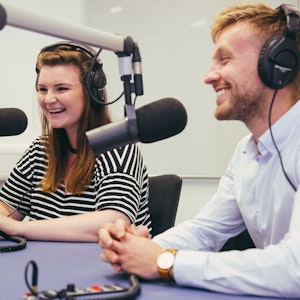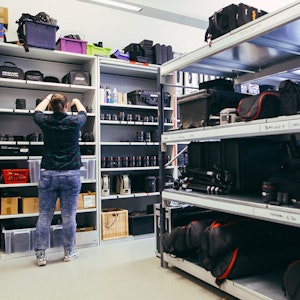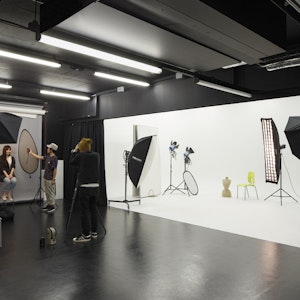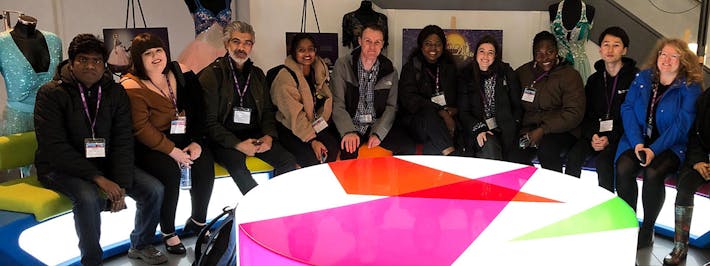
Data Journalism - MA / PgCert
Currently viewing course to start in 2024/25 Entry.
The MA in Data Journalism is a cutting edge course designed to give you the interactive storytelling skills needed to work within a growing number of jobs in the media and beyond....
- Level Postgraduate Taught
- Study mode Full Time/Part Time
- Location City Centre
- Award MA / PgCert
- Start date September 2024
- Fees View course fees
- School Birmingham School of Media
- Faculty Faculty of Arts, Design and Media
This course is:
Open to International Students
Overview
The MA in Data Journalism is a cutting edge course designed to give you the interactive storytelling skills needed to work within a growing number of jobs in the media and beyond.
The course has relationships with HuffPost and the BBC, as well as a number of other organisations covering broadcast, online and print data journalism, all of which are keen to bring in the skills that you will be developing on the course. You should indicate on your application in you wish to be considered for opportunities with those organisations during the course.
Studying under internationally renowned course leaders in a city with a vibrant cultural sector, and with access to a range of media organisations, you’ll learn exciting new skills in data journalism and interactive storytelling across a range of contexts, from mobile-first data journalism on social platforms, to practising data driven journalism within online and broadcast newsroom contexts. Partnerships with newspaper, magazine, online and broadcast organisations provide unique opportunities for students to build contacts and experience, and work on live projects.
What's covered in this course?
This practical course is designed to help you respond to work within a range of data journalism roles, from sourcing data, to investigating leads, and communicating your stories in new, engaging ways, in a range of newsroom contexts
Under the guidance of award-winning journalists who have worked with organisations ranging from the BBC and The Bureau of Investigative Journalism to The Guardian and specialist magazines, you’ll develop a keen eye for a story, develop advanced data driven journalism techniques that help you establish the facts, find out how to work within a range of newsroom contexts and tell those stories across a range of platforms.
You’ll get access to some of the industry’s most respected journalists who are working in the field now, learn about the legal, commercial and ethical contexts surrounding the future of journalism, and you’ll have the opportunity to work with wider data communities as you make a name for yourself in your chosen sector. Previous students have worked with organisations including the BBC, ITV News, Bureau Local, The Guardian, FullFact and the European Data Journalism Network.
You’ll have access to the facilities at BCU’s new Parkside campus, including radio and TV studios, and audio and video editing suites. You’ll have access to video and still cameras, audio recording equipment and mobile journalism kits to get out and capture the human side of the story too. You’ll be expected to find and report stories regularly, experimenting with new formats while exploring and testing the latest research into this exciting period in journalism’s development.
As the course progresses you will develop more specialist skills and connect with others already in the industry, building your reputation as you prepare to enter the industry. Graduates of the course have gone on to work as data journalists, data designers, digital editors and journalism consultants.
I honestly couldn't have done my job without the MA: I'm using R constantly and a lot of OpenRefine. The course taught me which sources I’d need to use to find data and how to accurately report what the figures mean.
Carmen Aguilar García, Data Journalist at The Guardian
Why Choose Us?
- Our unique partnership with HuffPost UK will give you the chance to receive tutorials and masterclasses from the HuffPost UK team, as well opportunities for placements and visits to their bureaus.
- Course leader Paul Bradshaw is a leading innovator in the field of online journalism. An experienced and practising journalist who works with the BBC data unit, he publishes the Online Journalism Blog, has authored a number of books about data journalism, and has a reputation as one of the most influential people in data journalism.
- The course has relationships with newspaper publishers and broadcast data teams both in the UK and internationally, a number of magazine brands covering both consumer and business media, and two online data operations in South America. The department is also part of Google’s News Lab University Network.
- This is the only course in the UK to be part of the Global Investigative Journalism Network, due to its excellence in the field.
- Birmingham is the base of the BBC's Data Unit as well as the BBC’s shared industry data team, the BBC Academy and BBC Three. Students regularly work with projects involving those teams.
- You’ll be involved in the annual Data Journalism UK conference, organised by Birmingham City University School of Media and the BBC Academy. It’s a chance to meet and learn from some of the country’s leading data journalists.
- Graduates have gone on to occupy senior positions in the media as Data Journalist, Data Designer, Stanford University Fellow, and media analyst, and been shortlisted for and won awards.
*Photo by Sara Chaudhry: the Data Journalism UK conference, organised by MA students with the BBC Academy
OPEN DAY
Join us on campus where you'll be able to find out more about your course, learn about postgraduate finance and get an insight into studying at BCU. Booking for the next event isn’t open yet. Register your interest below and we’ll email you as soon as booking goes live.
Next Event: 29 June 2024
Entry Requirements
Essential requirements
Essential Requirements
| Essential |
|---|
|
You should have a 2:1 or higher in a related discipline from any UK university. |
|
IELTS 6.0 overall with 5.5 minimum in all bands or its equivalent. |
If you have a qualification that is not listed, please contact us.
Fees & How to Apply
UK students
Annual and modular tuition fees shown are applicable to the first year of study. The University reserves the right to increase fees for subsequent years of study in line with increases in inflation (capped at 5%) or to reflect changes in Government funding policies or changes agreed by Parliament. View fees for continuing students.
Award: MA
Starting: Sep 2024
- Mode
- Duration
- Fees
- Full Time
- 1 year
- £8,925 in 2024/25
Award: PgCert
Starting: Sep 2024
- Mode
- Duration
- Fees
- Part Time
- 1 year
- Show fees
- £992 per 20 credits
- Year 1 - 60 credits
Fees for Part-time students
This course can be studied on a Part-time study basis. The cost per year of study is based on credit requirements for that year.
International students
Annual and modular tuition fees shown are applicable to the first year of study. The University reserves the right to increase fees for subsequent years of study in line with increases in inflation (capped at 5%) or to reflect changes in Government funding policies or changes agreed by Parliament. View fees for continuing students.
Award: MA
Starting: Sep 2024
- Mode
- Duration
- Fees
- Full Time
- 1 year
- £17,710 in 2024/25
Personal statement
You’ll need to submit a personal statement as part of your application for this course. This will need to highlight your passion for postgraduate study – and your chosen course – as well as your personal skills and experience, academic success, and any other factors that will support your application for further study.
Not sure what to include? We’re here to help – take a look at our top tips for writing personal statements and download our free postgraduate personal statement guide for further advice and examples from real students.
Course in Depth
MA modules
In order to complete this course you must successfully complete all the following CORE modules (totalling 180 credits):
Within the context of the increasing use of data within media organisations, Data Journalism aims to facilitate a flexible and adaptable skillset, including the use of ‘computational thinking’, that provides a basis for you to critically adapt to both new and existing data journalism techniques. The module provides practical skills within a range of frameworks applicable to the production practice routes of the award. It also provides a basis for the successful completion of the Master’s route project, and introduces potential avenues of practice-based inquiry for routes into PhD progression beyond.
The module is intended to help you develop and consolidate your ideas for your MA Major Project. By providing a common module that comprises of all MA Media cohorts, Research in Practice aims to facilitate a shared skillset that aids the successful completion of the MA Major project, as well as the potential for routes into PhD progression beyond. It is also designed to encourage interdisciplinary discussions across MA awards.
Specialist journalism and Investigations aims to facilitate a flexible and adaptable skillset that provides a basis for students to critically adapt to any chosen field of reporting. It also provides a basis for the successful completion of the master’s route project, and introduces potential avenues of practice-based inquiry for routes into PhD progression beyond.
The purpose of the module is to enable you to undertake a sustained, in-depth and theoretically informed research project exploring an area that is of personal interest to you. It is important that we can support you appropriately, so you will be guided towards choosing a research topic which is relevant to your discipline and in which your lecturers have expertise. The outcome may take the form of a written dissertation or a practical outcome with accompanying reflective, critical and contextual material. The main consideration when choosing your topic is that it must be relevant to your programme and you should consider the relevance of this topic to your future academic or professional development.
The purpose of this module is to enable you to develop professional attributes and subject skills through experience in the work place, and to critically reflect upon your learning in that context. You will normally be expected to arrange your own placement, with support from academic staff and BCU Careers. It is also possible to fulfil this module via a shorter placement duration and a linked ‘live’ project set by the employer.
Law, Regulation & Institutions focuses on key areas of the law and regulatory systems as they relate to the media, as well as allowing you to research those institutions which are important sources of news. The module will examine the ethical, regulatory and legal constraints under which journalists work. It will look in detail at issues including defamation, contempt of court and various reporting restrictions, human rights law, including the conflict between rights to privacy and to freedom of expression and copyright. It will enable you to develop a critical understanding of the limitations imposed by law and regulation on reporting and also look at those areas of law that work to protect journalists. You will develop a critical perspective on key debates in media law and regulation. The module will also introduce students to the core institutions of public life, particularly in the fields of politics, criminal justice, education, health and social welfare and business. You will conduct your own research into these areas as sources of news.
Within the context of media integration and convergence, Narrative: from media to interactive media aims to help students to build a flexible skillset that provides a basis to critically adapt to both new and developing storytelling technologies.
PgCert modules
In order to complete this course a student must successfully complete all the following CORE modules (totalling 60 credits):
Within the context of the increasing use of data within media organisations, Data Journalism aims to facilitate a flexible and adaptable skillset, including the use of ‘computational thinking’, that provides a basis for you to critically adapt to both new and existing data journalism techniques. The module provides practical skills within a range of frameworks applicable to the production practice routes of the award. It also provides a basis for the successful completion of the Master’s route project, and introduces potential avenues of practice-based inquiry for routes into PhD progression beyond.
Specialist journalism and Investigations aims to facilitate a flexible and adaptable skillset that provides a basis for students to critically adapt to any chosen field of reporting. It also provides a basis for the successful completion of the master’s route project, and introduces potential avenues of practice-based inquiry for routes into PhD progression beyond.
Law, Regulation & Institutions focuses on key areas of the law and regulatory systems as they relate to the media, as well as allowing you to research those institutions which are important sources of news. The module will examine the ethical, regulatory and legal constraints under which journalists work. It will look in detail at issues including defamation, contempt of court and various reporting restrictions, human rights law, including the conflict between rights to privacy and to freedom of expression and copyright. It will enable you to develop a critical understanding of the limitations imposed by law and regulation on reporting and also look at those areas of law that work to protect journalists. You will develop a critical perspective on key debates in media law and regulation. The module will also introduce students to the core institutions of public life, particularly in the fields of politics, criminal justice, education, health and social welfare and business. You will conduct your own research into these areas as sources of news.
The MA is completed full time across three semesters covering one year. The first semester focuses on a broad range of skills: you will be introduced to data gathering techniques, computer assisted reporting, and interactivity. You will also explore how to tell stories across different platforms using a range of media, including text, audio, video and visual journalism. You will also be developing an understanding of different research methodologies.
You’ll benefit from a blend of academic learning and practical application, exploring and applying the latest industry and academic research on cutting edge newsgathering, production and distribution techniques. Alongside this you will develop essential understanding of the legal and ethical contexts surrounding modern journalism.
In the second semester you explore data journalism in more depth, developing more advanced coding skills for finding and telling stories, alongside investigation skills and an understanding of law, regulation and security.
The final semester sees you developing a project or dissertation to build your reputation as a practitioner in your field. Previous examples have ranged from live working news websites and documentaries to ebooks, investigations, broadcast packages and portfolios of work for clients.
The PGCert version of the course consists of 60 credits of study completed across three semesters covering 12 months. The credits are obtained on three modules: Data Journalism in semester 1, and both Specialist Journalism, Investigations and Coding and Law, Regulation and Institutions in semester 2, with deadlines for those staggered across semester 2 and a final summer semester. This allows students to focus on building cutting edge skills in data journalism and investigation alongside their current employment.
Classroom projects
Examples of classroom activities you will be involved in include:
- Data-driven investigations that put a human face and establish the facts on topical issues
- Live newsrooms within various contexts, from online-only to broadcast newsrooms with associated online presence
- Experimentation with new forms of storytelling, from virtual reality and bots to interactivity and new social media platforms
Student stories
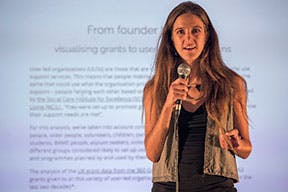
Victoria Oliveres
Scooped a £4000 prize in the 360 Giving data visualisation competition and now working as a data journalist with El Diario.
"As part of a competition launched by 360Giving I built a data visualisation that showed themes, amounts and organisations funded by grant makers. My tutor Paul shared the competition details and he’s always encouraging us to try new things, so I thought it would be a good way to practise and develop some of the visualisation skills we’ve learned. When my work was selected as one of the winners I felt so happy and euphoric! I couldn't believe it as I wasn't an expert in this field and was awarded £4000!"
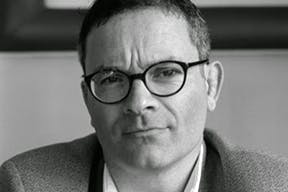
Jonny Jacobsen
Part of Jonny’s final project was published in the Royal Statistical Society’s magazine, Significance
"I wrote a first draft during my two-week RSS work placement in London and developed it further over the summer, interviewing key sources in London, Cardiff and Edinburgh. The main article ran in the October issue of the RSS magazine, Significance. I also published a separate piece in The Daily Mirror on some scandalous British Coal memos I found in the National Archives."
Employability
The course focuses on developing graduates at the cutting edge of contemporary professional practice, with a critical knowledge of the field leading practical application.
In addition to specific technical skills, students will also develop highly employable qualities in adapting to new technologies, and work towards building their contacts and reputation in the field. Opportunities to work with industry clients often lead to employment or the establishing of new enterprises.
Placements
Students on the MA can choose to undertake an industry placement, work with a client on a project or research entrepreneurship in practice. Previous students have undertaken placements or projects with clients including the BBC, The Guardian, the Open Knowledge Foundation, The European Data Journalism Network, the Royal Statistical Society, and the Centre for Investigative Journalism.
Links to industry
The course has strong links across all aspects of the media industry, including online, broadcast, magazines, newspapers, NGOs and new media startups. The school of media hosts the annual industry event Rethink Media, while Paul Bradshaw organises the annual Data Journalism UK conference in the city and is regularly invited to speak at industry events all over the world. The school’s global reputation in multiplatform journalism leads to frequent approaches from media organisations looking for cutting edge expertise or student input into new projects: examples range from Al Jazeera involving students in the design of a ‘news game’ and The Telegraph recruiting students to liveblog news events, to Centaur magazines inviting students to improve their social media performance and the BBC testing out new Snapchat content in class. Every year students attend a hackday at The Times, and one-off hackdays organised with the course include a music festival data hackday, transport data hackday and BBC election hackday.
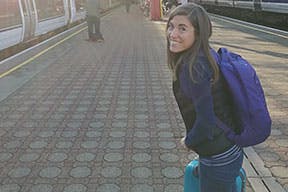
Our graduates
Carmen Aguilar Garcia
Carmen was employed as Sky News’s first data journalist in 2018 and now works for The Guardian.
“Honestly, I couldn't have done this job without the MA, because I'm using R constantly and a lot of OpenRefine. The course taught me which sources I’d need to use to find data and how to accurately report what the figures mean.
I chose to study at Birmingham City University because the course curriculum really stood out to me, along with the expertise and career path of the course leader. I would say the highlight was the industry events we attended and my advice to students would be to take advantage of the different events, hackdays, conferences and work placement opportunities.”
International
Birmingham City University is a vibrant and multicultural university in the heart of a modern and diverse city. We welcome many international students every year – there are currently students from more than 80 countries among our student community.
The University is conveniently placed, with Birmingham International Airport nearby and first-rate transport connections to London and the rest of the UK.
Our international pages contain a wealth of information for international students who are considering applying to study here, including:
- Explore some of the good reasons why you should study here.
- Find out how to improve your language skills before starting your studies.
- Find all the information relevant to applicants from your country.
- Learn where to find financial support for your studies.
Our students
The course regularly attracts Spanish-speaking students and we have a strong network of contacts in the Spanish-speaking world. Previous students have undertaken projects based in Spain and some of the course material is also available in Spanish. Paul Bradshaw is even learning to speak the language!
We have a growing network of contacts in Nigeria: two members of staff – Paul Bradshaw and Yemisi Akinbobola – won the prestigious CNN African Journalist of the Year award for an investigation published in Nigeria, and the pair plan to do more in the region.
Canadian students have done particularly well on the course. Undertaking projects in Canada as part of their studies enabled them to build their reputation in that jobs market. One now teaches journalism in Canada.
Facilities & Staff

Our Facilities
When you join Birmingham City University, the first thing you will notice is the high standard of our campuses.
With an investment of over £400 million across our buildings and facilities, we are committed to giving you the very best learning environment to help shape your experience.
State-of-the-art facilities
You will learn in our state-of-the-art facilities - including the £62m fully-digital Media Centre - located on the City Centre Campus. You will enjoy access to extensive studio and workshop space including four TV studios, six radio studios and broadcast-standard edit suites, as well as cutting-edge equipment and software.
Facilities include the largest TV floor of any university in the UK, a ‘green screen’ and a BOLT JR+ high-speed camera robot.
Our staff
Paul Bradshaw
Course Leader
Paul Bradshaw leads both the MA in Data Journalism and the MA in Multiplatform and Mobile Journalism at Birmingham City University, and works as a consultant data journalist in the BBC England data unit. He is also the founder of the investigative journalism crowdsourcing site, Help Me Investigate, which was shortlisted in...
More about PaulProfessor Diane Kemp
Professor of Broadcast Journalism
Diane worked for BBC radio and television as a broadcaster, reporter and producer and for a number of commercial radio stations before joining the University. She is course director of several postgraduate broadcast journalism courses and is deputy chair of the UK’s national accreditation organisation, the BJTC.
More about DianeNina Robinson
Lecturer BA Hons Journalism courses, Foundation courses, and MA Mobile & Multiplatform Journalism
Nina Robinson delivers Mobile and Multiplatform Journalism lectures to Masters and BA Hons Journalism to undergraduate students at Birmingham City University, home to the Sir Lenny Henry Centre for Media Diversity for whom she has been a recipient of grant funding for research into diversity of senior leaders in Radio News and has also written for...
More about NinaDave Harte
Deputy Head of English and Media and Associate Professor in Journalism and Media Studies
Dave Harte is Associate Professor in Journalism and Media Studies. He researches the emerging trend of local community ‘hyperlocal’ news websites and has published widely on the subject. Within the School of Media he leads on teaching and learning initiatives and teaches modules on Journalism Studies, Social Media, and Alternative and Community...
More about DaveDr Sarah Wood
Head of English and Media
Sarah Wood holds degrees from JMU, the University of Liverpool, and Birmingham City University, where she gained her PhD. Her research interests are in feminism and science fiction. She has an article on Octavia Butler forthcoming in FEMSPEC and is working on further studies of Butler as well as of Nalo Hopkinson and slave narrative.
More about Sarah

